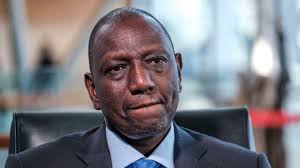President William Ruto has broken his silence after the High Court temporarily suspended the implementation of the amended Computer Misuse and Cybercrimes Act, saying the law is vital for protecting Kenyans, especially the youth, from online harm.
Speaking on Thursday, October 23, 2025, during the funeral of Weston Kerocho, the father of Inspector General of Police Douglas Kanja, in Laikipia County, Ruto said the government will not allow the internet to become a place where people are bullied, insulted, or misled.
“Our children are being terrorized on social media, which has led to depression and, in some cases, suicide,” the President said. “We cannot allow the internet to destroy young lives.”
Ruto explained that the amended cybercrime law aims to curb the growing cases of cyber harassment, identity theft, pornography, and online bullying that have affected many Kenyans.
He stressed that the government’s goal is not to silence critics but to encourage responsible use of digital platforms.
“This law is about protecting dignity, not limiting voices,” he added. “Freedom of expression must go hand in hand with responsibility.”
The President’s comments came days after a Nairobi court suspended the implementation of the new law following petitions by civil society groups and digital rights activists.
The petitioners argued that some sections of the Act could be misused to suppress free speech and target journalists or government critics.
However, Ruto defended his decision to sign the bill into law, calling it a necessary reform in an era of misinformation and online crime. He said the government respects the court’s decision but will continue to advocate for laws that create a safe digital environment.
The amended Computer Misuse and Cybercrimes Act introduces tougher penalties for:
• Spreading false information,
• Cyber harassment and online defamation,
• Identity theft and fraud, and
• Publishing indecent or harmful content.
The timing of the law’s signing — which coincided with national mourning over the death of Raila Odinga — drew mixed reactions. Some Kenyans praised it as a step toward restoring order online, while others criticized it as poorly timed and potentially restrictive.
Despite the controversy, Ruto reaffirmed that his administration remains committed to upholding freedom of speech while protecting citizens from online exploitation.
“We want the internet to be a space for education, innovation, and connection — not destruction,” the President said.
The amended law is expected to take effect once the court concludes its review and it is formally published in the Kenya Gazette.



